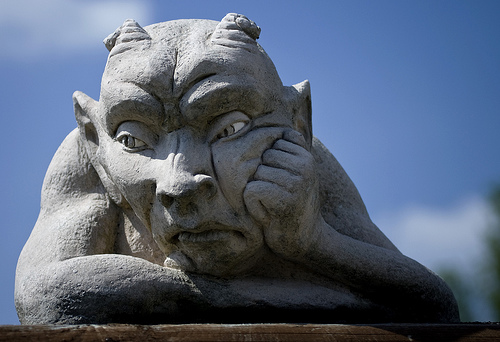
I was curious how bad things had gotten in the Christmas shopping world, so I conducted an anthropological experiment which ended when I was asked to leave the store by a senior dishwasher salesman.
This year, Canadians — or at least the people who sell them things — have openly embraced the dubious American phenomenon known as Black Friday, even though our Thanksgiving happens on a Monday in October.
Up here our consumer culture isn’t really that different than it is south of us, it’s just a little more self-conscious and toned down. Canadians would be embarrassed to buy, for example, a velvet-and-rhinestone painting of a waterfall at a truck stop, or a five-pound pack of Nibs. And so it’s not on offer up here. I kind of like that, and I guess that’s why the widely-welcomed invasion of Black Friday left me a little uneasy at first. I liked our Canadian consumer self-consciousness while it lasted.
Maybe it’s not so bad. It’s a symbiotic relationship that was bound to happen. Retailers are always looking for The Sale, and customers are always looking for The Deal. Black Friday is a day when both parties are guaranteed to get what they’re looking for with no shame implied on the part of either, and I guess there’s nothing wrong with that. It’s a little like what happens when the fleet comes into port and the local seaside establishments turn on their red lights.
This exchange is happening all the time, but Christmas is when the retailers really want to get the turnstiles spinning. There’s nothing terribly clever about the way they market their clothes and perfumes and phones, certainly nothing more clever than the now-ancient custom of pricing an item at $9.99 instead of ten dollars.
They don’t need to be clever, because both parties come to the table willing. And maybe that’s why it’s all so absurd. We’re so used to waif-proportioned mannequins and plastic Santa Villages that their ridiculousness is almost transparent to us.
So that’s why I went to the mall with my Nikon this weekend. The plan was to take images of the decked halls and gay apparel, then go do something in real life like read a book or walk in the park, and then look at the photos later when I’ve detoxed from the mall air, and see how silly it all really is.
The whole Christmas mall menagerie is so silly that it can barely offend anymore. It doesn’t warrant a serious condemnation, and being hard-nosed about it is a little like picketing a WWE event to convince showgoers that it isn’t real wrestling. More than anything I wanted to be entertained, and I was.
What fascinates me in particular are the images and displays that retailers use to lubricate this mass-transaction and get us in the mood. Fake boughs of holly hung with no hint of irony or kitch. Sterile plastic trees with wrapped empty boxes beneath them. White, flaky fuzz sprayed on window-corners by the canload, meant to remind us of some Charles Dickens book we know about but have never read. Read More



 I'm David, and Raptitude is a blog about getting better at being human -- things we can do to improve our lives today.
I'm David, and Raptitude is a blog about getting better at being human -- things we can do to improve our lives today.
It all pretty the opposite if you're not in the US :) Since 2022 I've changed 3 countries and I'm planning to emigrate to the fourth one. I've had so much novelty and so many things to adapt to. However, time had never run so fast for me as in 2022...